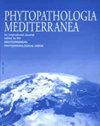Diversity of Botryosphaeriaceae species associated with canker and dieback of avocado (Persea americana) in Italy
IF 1.9
3区 农林科学
Q2 AGRONOMY
引用次数: 1
Abstract
Increased branch canker and dieback were observed in commercial avocado (Persea americana) orchards in Sicily, Italy. Surveys were conducted in 2021 and 2022 on 11 orchards to investigate etiology of the disease. Seventy-five plants from four orchards, showing branch canker and dieback, were sampled. Isolations from woody diseased tissues revealed the presence of fungi (Botryosphaeriaceae). Identification of the isolates was achieved by morphological and multi-loci phylogenetic analyses (Maximum Parsimony and Maximum Likelihood) of the ITS, tef1-α, and tub2 loci. Botryosphaeria dothidea, Lasiodiplodia citricola, Macrophomina phaseolina, Neofusicoccum cryptoaustrale, and Neofusicoccum luteum were identified. Representative isolates collected from the orchards, characterized based on the tub2 locus and identified as N. parvum, were excluded from this study, since this species has already been reported in our territory. Pathogenicity tests were conducted on potted, asymptomatic, 2-year-old avocado trees using mycelial plugs. These tests showed that all the Botryosphaeriaceae species characterized in this study were pathogenic to avocado. This is the first report of L. citricola, M. phaseolina and N. cryptoaustrale causing canker and dieback on avocado trees, and is the first record of these fungi causing branch disease on avocado in Italy.意大利牛油果(Persea americana)溃疡病和枯死病相关的牛油果科物种多样性
在意大利西西里岛的商业鳄梨(Persea americana)果园中发现树枝溃疡病和枯萎病增加。在2021年和2022年对11个果园进行了调查,以调查该病的病因。来自四个果园的75株植物显示树枝溃烂和枯死。从木质病变组织中分离出真菌(Botryosphaeriaceae)。通过ITS、tef1-α和tub2位点的形态和多位点系统发育分析(最大简约性和最大似然性)来鉴定分离株。鉴定出了褐球菌、citricola Lasiodiplodia citricola、phaseolina Macrophomina cryptoaustrale nefusicoccum cryptoaustrale和nefusicoccum luteum。从果园中收集的代表性分离株,根据tub2位点鉴定为小孢子虫,由于该物种已在我国境内报道,因此被排除在本研究之外。用菌丝塞对盆栽、无症状的2岁牛油果树进行了致病性试验。结果表明,本研究所鉴定的牛油果科植物均对牛油果具有致病性。本文首次报道了引起牛油果溃疡病和枯死病的柠檬酸乳杆菌(L. citricola)、菜绿乳杆菌(M. phaseolina)和隐澳洲乳杆菌(N. cryptoaustrale),也是意大利首次报道这些真菌引起牛油果枝病。
本文章由计算机程序翻译,如有差异,请以英文原文为准。
求助全文
约1分钟内获得全文
求助全文
来源期刊

Phytopathologia Mediterranea
生物-植物科学
CiteScore
4.40
自引率
8.30%
发文量
28
审稿时长
6-12 weeks
期刊介绍:
Phytopathologia Mediterranea is an international journal edited by the Mediterranean Phytopathological Union. The journal’s mission is the promotion of plant health for Mediterranean crops, climate and regions, safe food production, and the transfer of new knowledge on plant diseases and their sustainable management.
The journal deals with all areas of plant pathology, including etiology, epidemiology, disease control, biochemical and physiological aspects, and utilization of molecular technologies. All types of plant pathogens are covered, including fungi, oomycetes, nematodes, protozoa, bacteria, phytoplasmas, viruses, and viroids. The journal also gives a special attention to research on mycotoxins, biological and integrated management of plant diseases, and the use of natural substances in disease and weed control. The journal focuses on pathology of Mediterranean crops grown throughout the world.
The Editorial Board of Phytopathologia Mediterranea has recently been reorganised, under two Editors-in-Chief and with an increased number of editors.
 求助内容:
求助内容: 应助结果提醒方式:
应助结果提醒方式:


